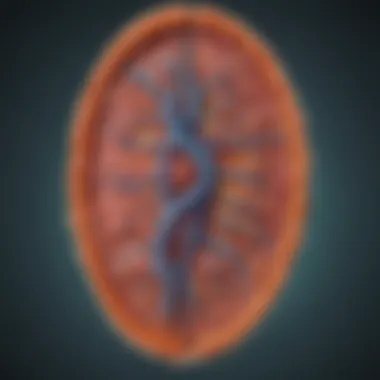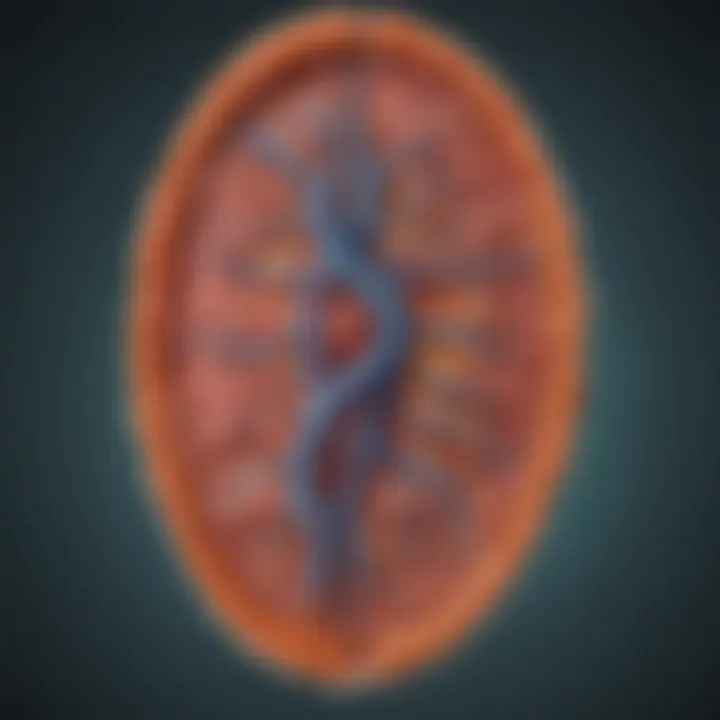Understanding Mitochondrial Disease and Specialized Care


Intro
Mitochondrial diseases represent a group of complex disorders that stem from malfunctions in the mitochondria, the essential powerhouses of the cells. These conditions can lead to a range of severe health complications, affecting multiple organ systems. Understanding these diseases requires not only knowledge of their biological basis but also insight into their diagnosis and treatment. Specialized doctors play a pivotal role in managing mitochondrial diseases, offering expertise that is critical for effective patient care.
Mitochondrial dysfunction has various manifestations, often making diagnosis challenging. Common symptoms include muscle weakness, neurological deficits, and metabolic disorders. As awareness grows regarding these complexities, the importance of research and specialized medical personnel in the field becomes increasingly apparent. This article will explore the latest advancements in mitochondrial disease research, outline the methodologies important for diagnosis and treatment, and shed light on the interdisciplinary efforts necessary for comprehensive patient management.
Intro to Mitochondrial Diseases
Mitochondrial diseases represent a complex group of disorders that affect the body's ability to produce energy, primarily due to dysfunction in mitochondria. Understanding these diseases is crucial because they can impact any organ system, leading to a diverse range of symptoms. These disorders often remain underdiagnosed or misdiagnosed due to their varied presentation, underscoring the importance of awareness and specialized knowledge in this field. This article aims to illuminate the intricacies of mitochondrial diseases, delving into their definitions, historical context, and implications for patient care and research.
Definition and Overview
Mitochondrial diseases are genetic conditions that arise from faults in the mitochondria, the energy-producing structures within cells. Typically, these disorders stem from mutations in mitochondrial DNA or nuclear DNA. There are numerous types of mitochondrial diseases, such as Mitochondrial Myopathy, Leber’s Hereditary Optic Neuropathy, and MELAS syndrome, each varying in pathology and clinical manifestation.
Mitochondria are often described as the "powerhouses" of the cell, as they generate adenosine triphosphate (ATP), which is necessary for cellular processes. When these structures fail, patients may experience fatigue, muscle weakness, and a host of other systemic issues.
The healthcare community encounters challenges in recognizing and diagnosing these conditions, particularly because symptoms can overlap with other medical issues. Therefore, both education and clear definitions are paramount for proper healthcare responses.
Historical Context
The understanding of mitochondrial diseases has evolved significantly since they were first identified. Initial recognition of the role of mitochondria dates back to the late 19th century, but it wasn't until the 1960s that the connection between mitochondrial dysfunction and specific diseases was established. Research in molecular genetics throughout the 1980s and 1990s enabled clinicians to pinpoint specific mutations linked to various mitochondrial disorders.
In recent years, advancements in genetic testing have provided deeper insights into the inheritance patterns of these conditions and have improved diagnostic accuracy. With ongoing research, the historical context of mitochondrial diseases continues to grow, offering patients and families enhanced understanding and hope for future treatment options.
Pathophysiology of Mitochondrial Disorders
The pathophysiology of mitochondrial disorders is crucial for understanding how these diseases affect individuals. Mitochondria are the powerhouse of the cell, providing the energy necessary for various cellular functions. When mitochondrial function is impaired, it leads to a cascade of effects that can impact multiple systems of the body. This section will delve into the fundamental aspects of mitochondrial function and the manner by which its dysfunction can lead to disease.
Mitochondrial Function and Dysfunction
Mitochondrial function is essential for cellular health. These organelles generate adenosine triphosphate (ATP), which is the main energy currency of the cell. They also play a role in regulating metabolism, controlling apoptosis, and maintaining cellular calcium levels. Given their multiple functions, a failure in mitochondrial activity can manifest in various ways, particularly in high-energy demand tissues such as the nervous system and muscles.
Mitochondrial dysfunction may stem from several causes:
- Genetic mutations: Many mitochondrial diseases are caused by inherited genetic defects that alter how mitochondria operate. These mutations can affect mitochondrial DNA or nuclear DNA, leading to impaired energy production.
- Environmental factors: Certain toxins and drugs may hinder mitochondrial function directly or indirectly. These can include heavy metals, some antibiotics, and even some therapeutic medications.
- Ageing: Mitochondrial function naturally declines with age, contributing to age-related diseases.
Patients with mitochondrial dysfunction may present with symptoms ranging from mild fatigue to severe neurological impairment. This variability underlines the need for a strong understanding of mitochondrial biology for effective diagnosis and treatment.
Genetic Implications
The genetic implications of mitochondrial disorders are profound and multifaceted. Mitochondrial DNA is unique as it is inherited matrilineally. This means that mitochondrial conditions can be passed down from mother to child, resulting in family clusters of disease. Genetic mutations can lead to various disorders affecting distinct tissues and organ systems.
Understanding the specific genetic changes is vital for prognosis and treatment. Genetic testing can identify mutations and help in risk assessment for family members. A few important points about genetic implications include:
- Heteroplasmy: This term refers to the presence of a mixture of more than one type of mitochondrial DNA within a cell. The proportion of mutated to wild-type mtDNA affects the severity of the disorder.
- Nuclear genes: Some mitochondrial diseases are a result of defects in nuclear genes that code for mitochondrial proteins. This expands the complexity of the genetic landscape individuals face.
- Carrier status: Identifying carriers of mitochondrial mutations can inform family planning and preventive measures.
"Understanding the genetics of mitochondrial diseases is important not just for affected individuals but for their entire families."
Recognizing both mitochondrial and nuclear genetic factors is critical. It aids in developing targeted therapies, fosters better clinical management, and paves the way for potential breakthroughs in treatment. As research progresses, these insights will refine diagnosis and enhance care for individuals affected by mitochondrial disorders.
Clinical Features and Symptoms
Understanding the clinical features and symptoms of mitochondrial diseases is critical for several reasons. These illnesses can manifest in a variety of ways, often leading to misdiagnosis or delayed diagnosis. The symptoms can be wide-ranging and may involve multiple systems in the body. Therefore, an accurate recognition of these features helps in guiding treatment and managing patient care.
Neurological Symptoms
Neurological symptoms are commonly reported in individuals with mitochondrial diseases. These can include seizures, developmental delays, and cognitive impairments. Patients might experience difficulties with coordination, balance, and motor skills, which are crucial for daily activities. Additionally, migraines and strokes have been associated with certain mitochondrial disorders.


The presence of these neurological issues often signifies altered energy production in brain cells. Because neurons demand significant energy to function optimally, any disruption can lead to severe dysfunction. For instance, a condition such as Leigh syndrome is associated with prominent neurological deterioration.
Muscular Symptoms
Muscular symptoms form another significant aspect of mitochondrial disorders. These may present as muscle weakness, pain, or cramps. Affected individuals often report fatigue after physical activity, which is known as exercise intolerance. This is due to the muscle cells not receiving enough energy to effectively contract and recover.
The pattern of muscle involvement often varies between patients. Some may exhibit symptoms of myopathy, including progressive weakness and deterioration of muscle tissue. In severe cases, this can lead to conditions such as mitochondrial myopathy, which can significantly impair mobility and independence.
Systemic Manifestations
Systemic manifestations are vital to understanding how mitochondrial diseases impact various organ systems. Since mitochondria are present in nearly all cells, dysfunction can lead to a range of symptoms affecting the heart, liver, kidneys, gastrointestinal tract, and more. For instance, heart problems such as cardiomyopathy can arise, leading to complications in circulation and overall health.
Other systemic symptoms might include diabetes, endocrine dysfunctions, or issues with the gastrointestinal system. These systemic traits often complicate diagnosis since they can mimic other common conditions. Thus, thorough clinical evaluation is necessary to differentiate these conditions and develop an appropriate care plan.
"A comprehensive assessment of symptoms enables healthcare providers to tailor interventions that significantly improve patient’s lives amidst these complexities."
Diagnostic Approaches
Understanding the diagnostic approaches in mitochondrial disease is crucial as it lays the groundwork for effective patient management. These diagnostic methods help in identifying mitochondrial dysfunction, informing treatment plans, and guiding ongoing patient care. Accurate diagnostics can also clarify the prognosis, allowing families to understand the potential trajectory of the condition.
Clinical Evaluation
Clinical evaluation serves as the initial step in diagnosing mitochondrial diseases. Doctors gather a thorough medical history and perform a detailed physical examination. During this process, they evaluate neurological function, muscle strength, and overall metabolic health. Symptoms can greatly vary among individuals, so identifying nuanced signs is essential. Key indicators often include developmental delays, seizures, and muscle weakness. In this evaluation, doctors often rely on a multi-disciplinary approach, often involving neurologists, metabolic specialists, and geneticists.
Genetic Testing
Genetic testing has emerged as a cornerstone in diagnosing mitochondrial diseases. It allows for the identification of specific mutations within mitochondrial DNA or nuclear DNA that contribute to the dysfunction. Knowing the genetic basis of the disease can aid in determining the specific type of mitochondrial disorder and assess the risk of transmission to future generations. Furthermore, genetic testing can facilitate access to clinical trials and targeted therapies. Patients should carefully discuss with their healthcare providers to understand the implications, such as privacy concerns or insurance coverage.
Metabolic Testing
Metabolic testing provides another layer in the diagnostic process, assessing biochemical markers indicative of mitochondrial disease. This testing includes serum amino acids, organic acids in urine, and lactate levels in blood. Elevated levels of these markers typically signify impaired energy production. Anomalies in metabolic profiles can help confirm or rule out mitochondrial disorders. This testing often complements genetic results, providing a more complete picture of the patient's condition.
Effective diagnostic approaches are essential for developing personalized care strategies, enabling better patient outcomes.
Role of Mitochondrial Disease Doctors
Mitochondrial diseases encompass a diverse range of disorders affecting mitochondrial function, which is crucial for cellular energy production. The role of specialized doctors in this field is integral to the management and treatment of these complex conditions. Specialized doctors not only have extensive knowledge of the underlying biology but also understand the multifaceted effects of these diseases on patients. Their expertise leads to improved diagnostic accuracy and tailored treatment strategies.
Defining the Specialists
Mitochondrial disease doctors typically hail from various medical backgrounds, such as neurology, genetics, or metabolism. They possess a deep understanding of mitochondrial pathophysiology and its impact on overall health. These specialists often take on the role of a primary care physician for patients with mitochondrial disorders, coordinating care across multiple disciplines. This patient-centered approach ensures that all aspects of the disorder are addressed.
Moreover, they keep updated with the latest research findings and treatment protocols, allowing them to provide the most current care options. It is important for these doctors to be skilled in genetic counseling, as many mitochondrial disorders have a hereditary basis. This unique blend of skills makes them crucial figures in the management of mitochondrial diseases.
Interdisciplinary Collaboration
The management of mitochondrial diseases often requires collaboration across various specializations. Mitochondrial disease doctors work closely with other healthcare providers, including nutritionists, rehabilitation specialists, and psychologists, to create a comprehensive care plan. This interdisciplinary approach is vital since patients may experience a mix of neurological, muscular, and systemic symptoms.
"The collaborative efforts of various specialists can lead to significant improvements in patient outcomes and quality of life."
Regular meetings and communication among specialists foster a well-coordinated treatment strategy. This teamwork also allows for sharing insights and experiences, enriching the care provided to patients. Furthermore, interdisciplinary collaboration promotes research initiatives aimed at understanding mitochondrial diseases better and developing new therapies.
Continuing Education and Research
Given the rapidly evolving nature of mitochondrial disease research, specialized doctors must engage in continuing education. Attending conferences, participating in workshops, and contributing to scholarly articles are essential for staying informed. This ongoing education allows doctors to incorporate the latest advancements and treatment modalities into their practice.
In addition, many specialists are involved in research projects themselves. By pushing the boundaries of what is currently known, they contribute to the development of new therapies, which can lead to better patient outcomes. This dedication to research also helps in refining existing treatment protocols and guidelines.
Overall, the role of mitochondrial disease doctors is pivotal in ensuring that patients receive comprehensive, up-to-date, and effective care. Their specialized knowledge, collaborative approach, and commitment to education and research make them a cornerstone of mitochondrial disease management.


Patient Care Strategies
The management of mitochondrial diseases represents a complex challenge that requires tailored approaches to patient care. These disorders often involve multiple systems within the body, leading to diverse clinical manifestations and varied response to treatments. As such, patient care strategies need to be multifaceted, focusing not just on addressing the symptoms but also on enhancing the overall quality of life for patients.
Personalized Treatment Plans
Personalized treatment plans are critical for managing mitochondrial diseases. Each patient’s genetic background, symptom profile, and overall health condition must be considered when developing a management strategy. This individualized approach allows healthcare providers to select interventions that are most likely to benefit the patient based on precise factors.
A key aspect of personalized treatment is nutritional support. Many mitochondrial patients benefit from diets that optimize mitochondrial function, such as the ketogenic diet. This type of diet may help improve energy metabolism and reduce symptoms. Moreover, it is essential to involve dieticians specialized in metabolic disorders to ensure nutritional adequacy while considering personal preferences and tolerances.
In addition to diet, medications tailored to the specific dysfunction identified in each patient are vital. Supplements such as Coenzyme Q10 and mitochondrial cocktails containing a mixture of vitamins and minerals may support mitochondrial function. Ongoing assessment and adjustment of these personal plans are crucial, as the effectiveness may change over time.
Managing Symptoms
Effectively managing symptoms is a primary goal in the care of patients with mitochondrial diseases. Given the wide range of symptoms that may occur in these conditions, an interdisciplinary approach is often necessary. Involvement of specialists like neurologists, cardiologists, and physiotherapists can provide comprehensive care tailored to individual needs.
Common symptoms like fatigue, pain, and muscle weakness need thoughtful interventions. Physical therapy is often recommended to help maintain muscle tone and improve physical function. Patients might also benefit from occupational therapy, which can assist in adapting everyday activities to their energy levels and capabilities.
"A holistic approach to managing symptoms leads to better quality of life for patients with mitochondrial disease."
Additionally, pain management strategies should be personalized and can include medications, physical therapy, and alternative approaches like acupuncture or massage therapy. Regular follow-up appointments ensure that treatment efficacy is assessed and any emerging symptoms are promptly addressed.
Supportive Therapies
Supportive therapies represent an integral part of managing mitochondrial diseases. These therapies do not necessarily treat the disease but are essential for enhancing patient comfort and coping. They include psychological support, rehabilitation services, and palliative care.
Psychological support is especially important as chronic illness can lead to anxiety and depression, impacting a patient’s overall quality of life. Access to mental health professionals can ensure that patients and families receive emotional support, coping strategies, and therapy as needed.
Rehabilitation plays a significant role in maintaining a patient’s functioning and independence. Tailored exercise therapy can improve strength and endurance. Meanwhile, palliative care offers holistic support at any disease stage, focusing on providing relief from symptoms and stress.
In summary, effective patient care strategies for mitochondrial diseases emphasize personalization, symptom management, and supportive therapies. A collaborative effort involving multiple specialties enhances the patient’s journey through these complex disorders.
Research Advances in Mitochondrial Diseases
Research advances play a pivotal role in the understanding and management of mitochondrial diseases. As scientific investigation continues to unfold, new insights into mitochondrial dysfunction are being uncovered. These advances not only inform clinical practices but also raise hope for improved treatment strategies. Several critical components define the landscape of research in mitochondrial disorders, including emerging therapies, clinical trials, and future research directions. Each of these elements contributes to shaping patient outcomes and expanding the knowledge base necessary for effective care.
Emerging Therapies
Emerging therapies represent one of the most exciting aspects of mitochondrial disease research. The focus here is on innovative treatments that can address the specific mechanisms of mitochondrial dysfunction. Some of these therapies include:
- Lifestyle Interventions: Adjustments in diet and exercise regimens can enhance mitochondrial function. Nutrients such as Coenzyme Q10, L-carnitine, and B vitamins are being assessed for their potential benefits.
- Gene Therapy: Advances in gene therapy hold promise for correcting genetic defects at their source. Techniques like CRISPR are being explored to potentially rectify mutations responsible for mitochondrial disorders.
- Pharmacological Agents: Several new drugs aim to restore mitochondrial function or alleviate symptoms. One notable example is the use of antioxidants to combat oxidative stress, which is commonly associated with mitochondrial diseases.
These novel approaches not only aim to manage symptoms but also target the underlying causes of mitochondrial dysfunction.
Clinical Trials
Clinical trials are essential for assessing the efficacy and safety of new therapeutic approaches. Numerous studies are currently underway, focusing on both novel drugs and existing medications repurposed for mitochondrial diseases. These trials help establish evidence-based practices.
Key considerations in clinical trials for mitochondrial disorders include:
- Patient Selection: Identifying suitable candidates is crucial. Trials seek participants across different age groups and with various mitochondrial disorders to generate comprehensive data.
- Endpoints: Defining clinical endpoints is complex. Researchers must choose appropriate measures of efficacy, which can include improvements in physical function, neurological assessments, and quality of life metrics.
- Collaboration: Interdisciplinary teams are forming partnerships, integrating expertise from genetics, neurology, and metabolic medicine. This collaboration is vital for enhancing trial designs and outcomes.
Engaging in clinical trials not only offers patients access to cutting-edge therapies but also contributes vital data that shapes future treatments.
Future Directions in Research
The future of research in mitochondrial diseases is filled with potential. As scientists continue to delve deeper into mitochondrial biology, new questions emerge that could lead to groundbreaking discoveries. Areas of focus for future research include:
- Mechanistic Studies: Understanding the precise mechanisms of mitochondrial dysfunction will guide the development of targeted therapies.
- Biomarkers: Identifying reliable biomarkers for mitochondrial diseases can enhance diagnosis and track therapeutic outcomes.
- Longitudinal Studies: Conducting long-term studies is essential to understand the progression of mitochondrial disorders and evaluate the effectiveness of therapies over time.
- Patient Registries: Establishing comprehensive patient registries can create valuable databases for research and improve collaboration across research institutions.


"Continued investment in research will accelerate progress in treating mitochondrial diseases, transforming patient care and outcomes."
As we look ahead, an emphasis on collaborative, innovative, and patient-centered research will be key in revolutionizing the management of mitochondrial disorders.
Genetic Counseling and Ethical Considerations
Mitochondrial diseases often stem from complex genetic factors that make understanding and navigating these conditions challenging. Genetic counseling plays a crucial role in helping patients and families comprehend the implications of these diseases. This process involves much more than simply discussing inheritance patterns. It provides a platform for exploring potential risks, understanding test results, and fostering informed decisions regarding health care and family planning.
Importance of Genetic Counseling
Genetic counseling is essential for several reasons. First, it helps demystify how mitochondrial diseases are inherited. As many have both maternal and paternal contributions to the mitochondrial genome, the genetic aspects can be confusing. Counselors can clarify these dynamics for families.
Second, genetic counselors aid in decision-making. Patients may need assistance in choosing whether to undergo genetic testing, access screening options, or consider reproductive choices. Engaging with a skilled counselor can empower patients and families to make choices that reflect their values and desires.
Lastly, genetic counseling can provide emotional support. Receiving a diagnosis or discovering one’s risk for a mitochondrial disorder can provoke stress and anxiety. A counselor can guide families through their emotions, providing strategies to cope with this new reality. This includes navigating available support resources to alleviate the burden of uncertainty.
Ethics of Genetic Testing
Ethical considerations surrounding genetic testing in mitochondrial diseases require careful evaluation. One key concern is informed consent. Individuals must fully understand the ramifications of undergoing genetic tests—this includes potential outcomes and psychological impacts. Ensuring that patients grasp these concepts is paramount to ethical practice.
Another pressing issue is the discrimination risk. Genetic test results can lead to potential biases in areas such as insurance and employment. Protecting patient privacy and rights is essential. Regulations must shield individuals from loss of opportunities based solely on their genetic predispositions.
Additionally, the implications of genetic findings extend beyond the individual. Family members may also be affected by the results. Counselors must consider how to communicate results to families without inducing unnecessary fear or stigmatization.
"Genetic counseling is a bridge between complex science and compassionate care, guiding families towards understanding and empowerment in the context of mitochondrial diseases."
Living with Mitochondrial Disease
Living with mitochondrial disease presents a unique set of challenges and considerations. Mitochondrial diseases often affect multiple systems in the body, leading to a spectrum of symptoms that can vary greatly from person to person. This unpredictability can complicate daily life, impacting not only the affected individuals but also their families and caregivers. Understanding these aspects is crucial for enhancing quality of life and ensuring sufficient support.
Quality of Life Considerations
Quality of life for individuals living with mitochondrial disease encompasses various factors, including physical, emotional, and social wellbeing. Here are some key considerations related to quality of life:
- Physical health management: Regular medical care is essential for managing symptoms and mitigating complications. This may include medications, therapies, or treatments tailored to each person’s specific condition. Individuals may need to prioritize rest and adapt activities to conserve energy.
- Mental health support: Coping with a chronic illness can lead to feelings of isolation, anxiety, or depression. Access to mental health professionals who understand mitochondrial diseases can provide valuable support. Support groups also serve an important role in fostering social connections, enabling individuals to share their experiences.
- Adaptive strategies: Modifications in daily routines and environments can significantly improve quality of life. For instance, using assistive devices might enhance mobility and independence. This adaptability allows individuals to participate in activities they enjoy, contributing positively to their overall wellbeing.
"Understanding and addressing quality of life issues is as crucial as treating the physical symptoms of mitochondrial disease."
Supporting Families and Caregivers
Families and caregivers are integral to the support system for those living with mitochondrial disease. Their role is often demanding and requires both emotional and practical assistance. Here are important facets regarding support for families and caregivers:
- Education and resources: Educating families about mitochondrial diseases is vital. They need to understand the condition, its implications, and ways to provide care effectively. Resources can include informational materials, workshops, and online forums.
- Emotional support: Caregiving can be emotionally taxing. Access to counseling and support networks can provide caregivers with the necessary outlets for their feelings. Caregivers often need recognition for their efforts, enabling them to feel valued and understood.
- Respite care: Offering temporary relief for caregivers allows them to recharge physically and mentally. This could involve professional care services or programs designed to give caregivers time to focus on their well-being without compromising the care recipient.
Culmination
Understanding mitochondrial disease is crucial for several reasons. First, these diseases encompass a wide variety of symptoms and complications, making accurate diagnosis and personalized treatment vital. Specialized doctors, such as metabolic specialists and genetic counselors, play an essential role in managing these complex conditions. They must not only diagnose but also tailor treatment plans that address the unique manifestations in each patient.
Moreover, the concluding section reflects on the ongoing need for interdisciplinary collaboration in the healthcare environment. By pooling resources and knowledge from various specialties, healthcare providers can advance patient outcomes.
Summary of Key Insights
The key insights from this article emphasize the multifaceted nature of mitochondrial diseases. Important points include the significance of accurate diagnosis, the essential role of specialists, and the impact of ongoing research. It is evident that a thorough understanding of mitochondrial function, genetic factors, and clinical features is necessary for effective management.
In addition, patient care strategies highlight the importance of personalized treatment approaches while addressing symptom management, which can greatly enhance the quality of life for affected individuals. These insights collectively underscore the value of ongoing education and research to keep healthcare professionals informed about advancements in the field.
The Future of Mitochondrial Disease Research and Care
The future of mitochondrial disease research is promising. Recent advancements are paving the way for new therapies that can mitigate the effects of mitochondrial dysfunction. Continuous exploration in areas such as gene therapy, pharmacological interventions, and metabolic management holds potential for transformative changes in treatment strategies.
Furthermore, researchers are increasingly focusing on the ethical aspects of genetic counseling and testing, ensuring that the benefits of these advancements are accessible while respecting individuals' rights. Ongoing collaboration between researchers, clinicians, and patients will be vital for translating scientific discoveries into practical care.
"The complexities of mitochondrial diseases require a continuous commitment to education and collaboration among healthcare professionals to optimize care outcomes."
As we look forward, fostering an environment of dialogue and understanding within the medical community is crucial for improving the lives of those affected by mitochondrial diseases.



